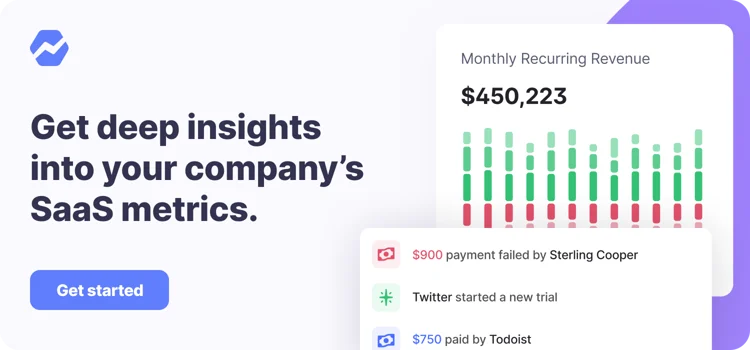Table of Contents

tl;dr In the past 6 months I turned down multiple $3-5m offers and failed to close a $5m sale.
In the past six years of Baremetrics’ existence, I’ve received dozens upon dozens of emails from folks interested in acquiring Baremetrics. When you’re running a transparent company that’s growing, it just comes with the territory. Generally these conversations quickly fizzle once they realize I’m not even remotely interested in some quick, 1x revenue sale.
However, this past April someone reached out that was capable and interested in spending more, so I started exploring that. I began reaching out for input from friends, investors and advisors and word got out that I had an offer, which ultimately resulted in even more buyers reaching out.
By mid-May I had four different LOIs in front of me, with offers ranging from $3-5m.
Mind you, mere weeks prior it wasn’t even remotely on my mind to sell Baremetrics. And now all of the sudden I’m being offered millions of dollars. My brain was spinning. I’ve always sort of assumed that the sale of Baremetrics would one day mean I make a decent chunk of money, but now it was “Hey Josh, you could be a millionaire in a matter of weeks!”
There’s always a price
I was still very torn on the idea. Baremetrics was (and is) still growing and the roadmap we’ve got has some huge things coming. It almost felt like I was selling (pun intended) the company short by taking any of these offers.
Most people will tell you, especially when things are going well, that they’re not interested in selling their company. But the thing is, there’s always a price. Sure, the price may be some obscenely huge multiple of revenue, but there’s a price. And that price could fluctuate based on any number of factors.
For me, this came at a time where, personally, life was…draining. Outside of work I wasn’t in a great place mentally. I was dealing with some family issues that were consuming every ounce of my mental energy. I was depressed, anxious and the most stressed I’ve ever been and the prospect of being able to sell the company and give myself and my brain a break was very appealing.
So, I accepted the top offer.
A long trip down a dead end road
Now, the thing with an LOI is that it isn’t a purchase agreement. It’s just a way for an interested buyer to formally say, “We’re interested at $X amount.” After you accept an LOI, you begin the painfully tedious due diligence process.
In due diligence, you’re essentially asked to pull together every single legal and financial document you or your team has ever interacted with over the existence of your business. For even the most organized person, this is a completely overwhelming task and takes many weeks, if not months, to properly do.
But, I accepted an offer for $4.95m, ~3.75x our revenue at the time, and it was off to the races on pulling together all of those due diligence documents. We’d planned on closing in mid-August.
Our attorneys got to work. I was having regular calls with our CPA and my financial advisor to figure out what all this meant for myself and our team. I was working on making sure everyone on our team would be taken care of and have jobs available to them as part of the transition.
During this time I was also having weekly calls with the buyer, checking in as they did their own research and (theoretically) had their lawyers looking over things while we did our work with diligence documents.
Then things started to get a bit…odd. The buyer kept hesitating to give us intros to their legal counsel. They’d opted to let our counsel write the Stock Purchase Agreement (which is very atypical because we’d obviously write it in our favor). They missed their own deadlines and started accusing us that we were holding the process up when we were getting them the things they asked for.
The deeper we got in to this, the worse I was feeling about it.
Then, a matter of days before the planned closing date, they ghosted us completely. As in stopped answering emails, stopped answering calls. Just…fell off the face of the earth.
We’d spent nearly $20,000 on legal fees and months of time gathering all the docs for proper due diligence, and they just disappeared. It was crushing. I was (and still am) furious with them. They wasted an epic amount of our time and money and then crawled in to a hole when they realized they couldn’t do the deal.
You see, it turns out they’d misrepresented their funding situation at the beginning. They claimed that they had the funds available when they made their offer. That’s key, because I wasn’t interested in doing a deal with someone who was going to have to go out and raise money to do it. But that’s exactly the situation we found ourselves in.
As the deal progressed we realized they actually didn’t have the funding but were “working hard to get their investors on board”. We were so far in that it seemed we might as well see it through. But, surprise, they couldn’t do it and so they bailed in the most cowardly way.
After that I went back to the drawing board to try and salvage all the work that’d been done with other interested buyers, but at the end of the day, none of the other offers (which were anywhere from $1m to $4.5m) made economic, logistical or cultural sense.
So, after 6 months of what was one the greatest emotional rollercoaster of my existence, I didn’t sell Baremetrics.
Absorbing insanity
In many ways, I feel like my job as CEO and Founder is to absorb all of the insane parts of running a business so my team can focus on building, learning and enjoying their jobs. They didn’t sign up to get on the rollercoaster. I did. I hated keeping all of this from the team, but in hindsight I’m very glad they didn’t get pulled in to all of it, especially as things started to fall apart.
So where does that leave us now?
I’m not one to drag things out. Once I know if a desired outcome is or isn’t possible, I make decisions instantly and move on. That’s how I felt with this. Once I realized we didn’t have any offers that I was happy with, I pouted for a day, then immediately jumped back in to running the company and planning out the future.
If anything, I feel an immense sense of relief to have this season over with. I’m as excited as ever to be able to have my focus back on building Baremetrics as both a product and a company. We’re hiring multiple new roles and we’ve got some pretty great things in the pipeline. On top of that I get to keep working with the amazing people on our team.
We just wrapped up our fifth company retreat and 2020 will be the biggest year yet for us!
If you’re interested, read about the 5 things I learned failing to sell the company!



